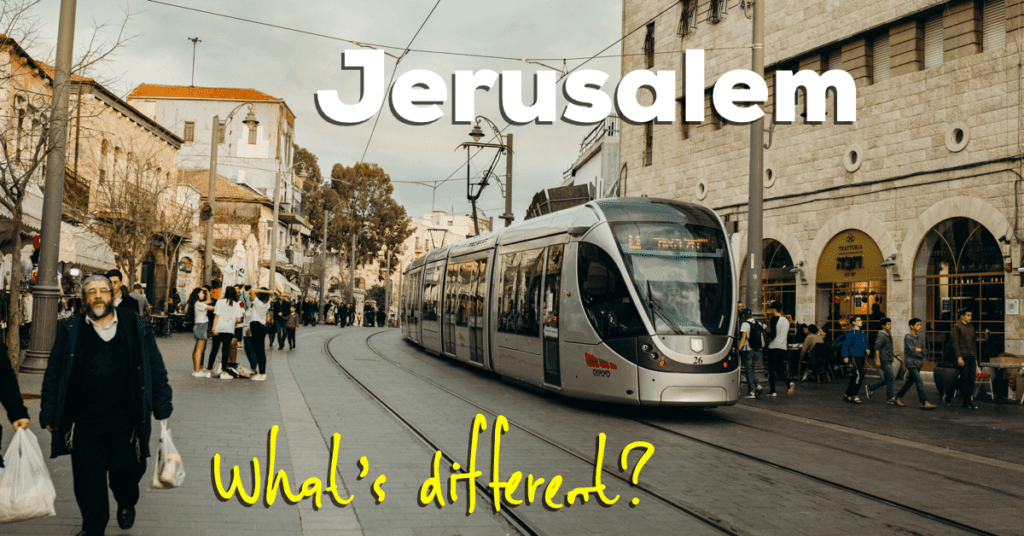Table of Contents
Jerusalem, What’s Different?
It’s a unique perspective to live in a city, then leave for eleven years and come back to see what’s different. Many watched changes evolve slowly, to the point where they may not even feel that something’s changed. Whereas others came long after I left and never saw it any other way. It’s a profound perspective to be able to contrast Jerusalem from two completely different angles.
For the most part, the city itself feels exactly as it was (with the goods, the bads, and the uglies), with five key changes. Four of them are quite positive. One… not so much. I’m going to explore each of these changes with a bit of a plea to go back in time on that last one, or at least call for some improvement.
1) Oh My Goodness, There’s A Train in Jerusalem
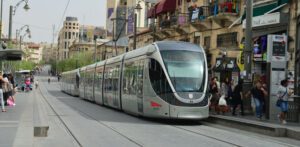
I’m still in awe every time I see this beautiful, little light rail running up and down Jaffa Street. Recalling Jaffa Street filled with cars and buses, busy and dirty and uninteresting, is amazing when you think about what it looks like now. No cars are muddling up what’s undeniably the most important street in all of Jerusalem, and there’s a quaint quasi-European feel as you walk through cafes and past bicycles, pedestrians, and dogs, occasionally interrupted by an unassuming train gently zipping by.
This one simple addition has changed the entire feel of the city, and it’s a profound improvement. I know there’s controversy over expanding to have other light rail projects throughout the city. Some concerns are somewhat warranted, but ultimately very short sighted. Perhaps even selfish. The train has improved transportation in a mega-crowded city with way too many cars, and has brought an intense vitality to an area that has lacked any level of intrigue or excitement for far too long.
2) That’s Not The Shuk
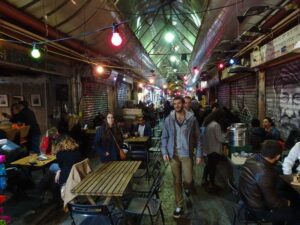
Not only did I spend a lot of time in the Mahane Yehuda market (the Shuk) once upon a time, I used to live in an apartment right above it (unquestionably the most horrific apartment I have ever lived in).
The Shuk has always been interesting and exciting. That is, until nighttime. All of the stores closed and there was absolutely nothing to say about it. It was just dark, filthy alleys with nothing happening.
What do I return to find? The whole area has been covered with amazing street art, and a magical changeover happens every night as this confined space becomes a strip of bars and restaurants, and the single best nightlife spot in all of Jerusalem.
It’s an incredible and very welcome change to the city.
3) Jerusalem People Have Chilled Out… A Bit
This one’s up for some debate, but even though the city is certainly filled with tension, and it’s most definitely the center of more religious conflict than other places in Israel, it still feels to me like a lot has dissipated.
When I walk through the aforementioned Shuk nightlife, I see such a variety of people. Jews and non-Jews, and every level of Jewish religiosity, all sitting in close proximity, enjoying craft beers and scwharma, without the feelings of animosity I grew accustomed to the first time I lived here.
It always used to feel like the elephant in the room in Jerusalem was that different types of people did not intermingle and that the more conservative among the city kept to themselves and were outcasts if they ventured into the “other” parts of the city.
Now it feels like everyone’s everywhere, people aren’t engaged in endless bickering over their differences (implicit or explicit), and it’s a much better city for it.
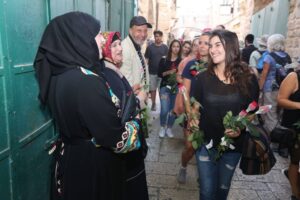
4) This Jerusalem is Much Calmer
Perhaps this feeling stems from the times. The majority of the time I was living in or near Jerusalem was during the Second Intifada. Tension was off the charts. It was a rough time in the life of anyone living here. Just about everyone was directly impacted by some form of terrorism, and the feelings of anger and fear that builds up in each individual have a detrimental effect on the society as a whole.
Is Jerusalem completely safe in 2017? It would be foolish to think Jerusalem will ever be 100% safe. Hell, I moved to peaceful ole Kansas just a few years ago and within a matter of months there was a deadly terrorist attack against two Jewish establishments. Nowhere is ever completely safe. However, the feel of walking through the streets of Jerusalem is relatively serene.
Jerusalem should always feel this way!
5) Where Have All The Hosts Gone
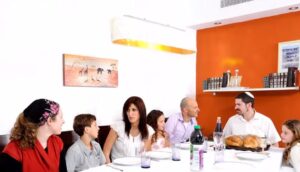
I must say that there is only one aspect of life in Jerusalem that I think has taken a drastic downturn. A huge percentage of this city either observes Shabbat (the Sabbath) or at least enjoys attending Shabbat meals.
When I used to live in Jerusalem, I found getting invited to meals as easy as breathing. I had more invitations than I knew what to do with, and I knew places I could go where an invitation was inevitable. And this was before everyone had internet on their phones and social media had taken over all of our communications.
I’m not so sure what has happened. Facebook groups and special online programs seem to have taken control of the hosting industry. And despite their noble and spirited efforts, they’re just not succeeding the way the brick and mortar ways of the past did.
Since returning, I have had many Shabbats where despite great efforts, I was unable to make plans. And I have watched as multiple people have desperately posted online at the last minute that they are looking for a host, with little or no comments.
I have no doubt that the kindness of the city has not decreased in the slightest. And I truly believe that everyone looking for a host could and should easily find one. But there’s some kind of disconnect, and I believe it’s an offshoot of the times. Everyone’s communicating so much, yet the level and quality of the communication have taken a turn for the worse.
Everyone's communicating so much, yet the level and quality of the communication have taken a turn for the worse. Share on X
But that’s neither here nor there.
No one in Jerusalem should enter their Shabbat nervous. Nor should they find themselves sitting lonely in a dark apartment eating crackers for any of their Shabbat meals.
What could be done?
Many synagogues across the world have two practices I love, both of which I think need to be incorporated into every place of worship here:
a. Kindhearted people who are always willing to take last-minute guests, who wander around and ask people if they’re all set.
b. A central person who knows the people who like to host, and makes an announcement that anyone who would like a place to eat should see them at the end of services.
Jerusalem has certainly come a long way. There’s room for improvement; but there’s definitely no room for decline. We could do better, and with a little concentrated thought and effort, our beautiful city can improve each and every day.

